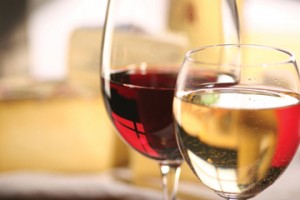Think twice before that glass of wine with dinner

Last week I had a great week on my nutritional plan and a fabulous week of fitness. I got back on my surgery leg in full training mode and completed a long “powerwalk” this past weekend to get my distance and speed up before the half marathon Aug. 26. That said, my plan week was not “perfect” (when are they ever perfect?) and it was not without struggle.
 Mid week, after a long work day of eight hours in meetings/presentations, I had a second client function over dinner. I decided to have two glasses of white wine with my healthy on-plan dinner. If you consider only the calories in the wine (40 per ounce), and even what those calories consist of, you might argue that’s not so bad. I diligently logged the calories in my food tracker and still came out okay on the day overall. Again, if you were counting calories (I am not) and believed a calorie is a calorie is a calorie (I do not), you might argue everything is on track. But keep reading.
Mid week, after a long work day of eight hours in meetings/presentations, I had a second client function over dinner. I decided to have two glasses of white wine with my healthy on-plan dinner. If you consider only the calories in the wine (40 per ounce), and even what those calories consist of, you might argue that’s not so bad. I diligently logged the calories in my food tracker and still came out okay on the day overall. Again, if you were counting calories (I am not) and believed a calorie is a calorie is a calorie (I do not), you might argue everything is on track. But keep reading.
After dinner, I realized the alcohol gave me the munchies. After only two glasses, I wanted to eat more and I feared a binge. So, I went for a walk and considered going to the gym late at night to work it off and help me resist the food. My friend Sean said, “Don’t bother.” Sean is a personal trainer and a student of the vast research on addiction, and in particular, the brain and obesity. He reminded me how alcohol affects the body. In essence, it shuts down fat burning for a period of time. He urged me to go to the gym if I wanted/needed to for psychological reasons to refrain from eating or binging. But, he suggested that if the reason was to burn fat I might be better off going to bed and getting some sleep.
It’s true. More important than the calories in a glass or two of wine are how your body metabolizes those calories. I had learned this, but in the moment forgot to consider HOW those alcohol calories are processed by my body. For starters, alcohol lowers blood sugar levels. And, unlike most foods, alcohol is processed by your liver where it converts the alcohol to acetate. While only a small amount of the alcohol actually becomes fat, most of it is released in the blood stream where your body burns it as a fuel source.
This all sounds just fine so far, right? NOT. If your body is burning the acetate, it is doing this instead or in place of burning the fat you already have in your system. So if you are trying to lose weight/fat and you subscribe to the optimal “burn fat, build muscle” approach that I do, drinking alcohol mid-week after a stressful day might not be such a good idea. It depends on how stressful the day and where you are in reaching your weight/fat loss goals. Ha! 🙂
Here’s a win blog I found online which says exactly that. Take note of this sentence: “You don’t want your body to start relying on the large intake of alcohol for its energy, instead of burning off your excess fat!” And here is another research based piece by Paramjit Sidhu titled: Alcohol’s Effect on Fat Burning and Appetite — (based on this study from the American Journal of Medicine.)
So, the next time I reach for that glass of wine – which I love – I will consider not only the calories and the health benefits of an occasional glass of wine, but rather whether I am prepared to shut down my fat burning state for a period of time as a result. Sometimes it will be worth it. Other times not. Knowledge and understanding will allow me to make the “right” choice for me at the time.
Cheers!
Lori






